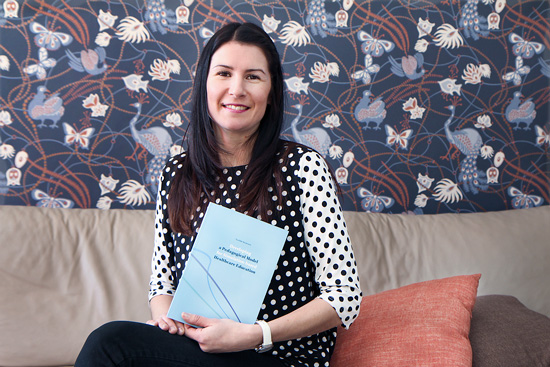The use of simulations has become an established part of healthcare education throughout the world. In her doctoral research, Tuulikki Keskitalo, M.Ed., has developed a new pedagogical model to support teachers in planning, implementing and evaluating simulation-based instruction.
 Photo: Irma Varrio
Photo: Irma Varrio
Teachers in healthcare have long used simulations in their work. These have included patient simulators as well as the use of Standardized Patient actors. Simulation-based teaching has been found to be effective, but it has remained unclear pedagogically when and how such instruction is best implemented.
In her doctoral thesis, Tuulikki Keskitalo presents a new pedagogical model that she has developed which is designed to help instructors plan, implement and evaluate their teaching. The ultimate aim of the model is to provide instruction that students will find more meaningful.
The model draws on the theory of socio-cultural learning, characteristics of meaningful learning, and research in the field to create a comprehensive whole, which has been lacking in the field to date. The research leading to development of the model was based on work with 21 instructors and 136 students at three institutions in Finland and at Stanford University in the United States.
Six-stage pedagogical tool
The model developed by Ms. Keskitalo breaks down simulation-based teaching into six stages. It facilitates the choice of methods, tools and materials to be used in teaching and guides teachers in dividing instruction into stages.
The model emphasizes the activities carried out before instruction proper as well as the evaluation and application of learning that occur thereafter. After real-time instruction, the model provides teachers with guidance enabling them to assess their work as a whole.
Simulations: a challenging environment for instructor expertise
Tuulikki Keskitalo’s research bears out the perception that simulation environments place considerable demands on the expertise required of instructors: an instructor must have the requisite expertise when it comes to course content as well as superior pedagogical skills and a positive attitude towards technology.
According to Ms. Keskitalo, teaching that makes use of simulations relies primarily on the guidance provided by the instructor. Ideally, instruction should be as student-centred as possible.
Ms. Keskitalo notes that students have high expectations regarding simulation-based teaching and learning. In addition, their conceptions of teaching and learning may vary, which poses difficulties in the teaching situation.
In this light, she goes on to point out that education in a simulation-based environment requires that particular attention be paid to how goal oriented, self-directed and individualized the teaching and studying are.
Information on the defence:
The public examination of Tuulikki Keskitalo’s doctoral thesis in the Faculty of Education,
Developing a Pedagogical Model for Simulation-based Healthcare Education, will take place on Friday, 10 April 2015 at noon. The defence will be held in lecture hall 2 at the University of Lapland, Yliopistonkatu 8, Rovaniemi. The Opponent will be Professor Kirsti Lonka of the University of Helsinki, and the Custos Professor Heli Ruokamo of the University of Lapland. Welcome!
Information on the doctoral candidate:
Eliisa Tuulikki Keskitalo (born in 1980 in Sodankylä) completed her matriculation examination in Sodankylä Upper Secondary School in 1999. She graduated with a master’s degree in education from the University of Lapland in 2006.
Since 2007 Ms. Keskitalo has worked as a researcher on simulation-based training in healthcare, serving as director of a number of related projects at the University of Lapland. She spent the period 2009-2010 as a visiting researcher at Stanford University.
Additional information:
Tuulikki Keskitalo
tel. 040 3524432
tuulikki.keskitalo(at)ulapland.fi
Press copies of the thesis are available from Lapland University Press, tel. 040 821 4242, julkaisu(at)ulapland.fi
Information on the publication:
Tuulikki Keskitalo,
Developing a Pedagogical Model for Simulation-based Healthcare Education. Acta Universitatis Lapponiensis 299. ISBN 978-952-484-811-4. ISSN 0788-7604. e-version (pdf): Acta Electronica Universitatis Lapponiensis 167. ISBN (pdf) 978-952-484-812-1, ISSN (pdf) 1796-6310.
Ulapland/Communications/RJ